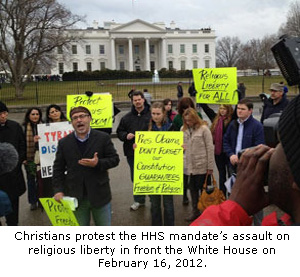
College students are calling for passage of a federal law to block the contraception mandate on their insurance exchanges under the new healthcare law.
Kristan Hawkins of Students for Life tells OneNewsNow students' premiums will be paying for contraception, sterilization surgery, and the "morning-after" pill, even if it violates their religious beliefs.
"It's the same mandate that we've been talking about since February nationally, but now it's being applied directly to university and college healthcare plans," she says. "So … we've been talking a lot to students about this and how this relates to them and why it's so important. Well, this just hammers it home because now they're going to be funding this in their tuition."
Hawkins accounts that once students are made aware of what the government is forcing them to do, they are enraged. But the passage of a measure currently before Congress would help them fight this mandate.
"There's a bill in Congress, [the] Respect for Rights of Conscience Act, sponsored by Congressman Jeff Fortenberry (R-Nebraska)," she reports. "We've got to get this bill passed in Congress and make President Obama account for this mandate."
Students for Life is making an action kit available for pro-life students to help energize their peers to take action against the ObamaCare requirement.
This coverage will also be available to college-age women who are not in school.
Contact: Charlie Butts
Source: OneNewsNow
















